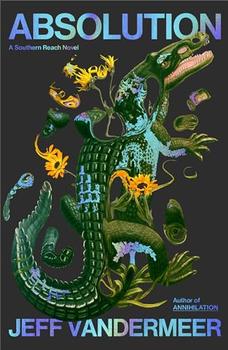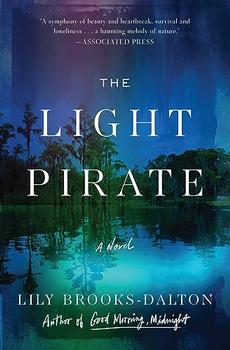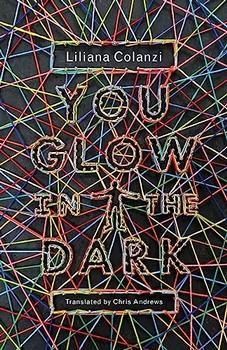Summary | Excerpt | Reviews | Beyond the book | Read-Alikes | Genres & Themes | Author Bio

Southern Reach, book 4
by Jeff VanderMeerTen years ago, the literary landscape was changed forever when Jeff VanderMeer became the "King of Weird Fiction" with his Southern Reach trilogy: Annihilation, Authority, and Acceptance (2014). A visionary bestselling series with change as a central theme, its horror revolves around looming dread and the lingering effects of an experience, rather than focusing on the "scare." With VanderMeer's fourth volume, Absolution, fans can expect answers to some questions that have been a source of speculation, though they may leave the book with even more. But for those of us especially fascinated by Area X's unusual ecosystems and amorphous, corporeal biology, both human and non, questions seem like a given—allowed and even welcomed. Asking questions is cool, and VanderMeer has free roam over the minds of his subjects. He knows it, too:
"So many people have read this series, which is basically about ambiguity and the unknowability of the universe, and completed the story in their heads and really engaged with their imaginations. I had a lot of freedom."
In the first book of the series, Annihilation, a government-funded expedition ventures into the quarantined zone of Area X, locked within an invisible Border along an abandoned Forgotten Coast, and clearly inspired by the Florida panhandle. Unexplained change ensues amongst the party. Mutations coexist alongside the odd charm of the landscape. Something has altered this place; we can't determine what. But there's beauty in ruin, in the idea that only from destruction can new life emerge. By the end of the third book, Acceptance, we're vaguely enlightened and yet still mostly in the dark regarding Area X and Southern Reach, the secretive agency responsible for the expeditions there. We do know the Border is encroaching upon the rest of Earth, and we fear what that might mean.
With decided purpose, VanderMeer doesn't explore that route. Writing a prequel rather than a sequel, he regales us in Absolution with chronicles of Area X in three expedition logs from throughout its history. Beginning 20 years before Annihilation, a researcher narrates the first story, quoting from biologists as they traverse the environment and document its phenomena—from carnivorous rabbits to the enormous alligator known as "the Tyrant." In the second story we follow Old Jim, caretaker of the Forgotten Coast's Village Bar and operative of Southern Reach who is obsessed with solving the puzzle of Area X. The last story is an expletive-laced narrative centered on one of the expedition members, a truly horrific account of madness and contamination. While the plot is structured and dependent on our own ecosystem, VanderMeer never directly references climate change, but he does show the consequences of human tampering on the environment.
Absolution would most likely baffle a new reader, though I would still recommend it to a seeker of the strange. For fans that read and loved the previous trilogy, it is a treat. VanderMeer's love for the craft is apparent; he has a merry time playing with language:
"The biologists cast nets for tiny fish in shallows. They set net traps for small woodland creatures. They took fine nylon nets and created capture zones for song-birds, often running aghast to the rescue of what they themselves had endangered, for a songbird was a terrible curse: unpredictable and angry and easy to harm ... How fragile those wings, those beaks, heads to the side, small bright eyes staring up at the aliens that held their bodies in half closed fists..."
Not for the faint of heart, reading Absolution sometimes feels like riding a roller coaster and crashing, breathless. The pacing is excellent—the rhythm of tension and menace, of clues and images. VanderMeer describes the environment and the inner monologues of his characters in hypnotic prose, words strung together like dreams, painting the picture so clearly it feels tangible. The characters are sparse but palpable; dropped into perilous situations, no one is singularly good or bad. All have shades of gray and flaws that make them whole.
VanderMeer writes his scenes like a film director, camera expanding and contracting depending on the situation. It is mesmerizing to experience, as disorientating yet beckoning as Area X. He leads us through a hallucinatory tunnel and only gradually comes up for air, revealing a nightmarish reality:
"The green light and the cleft between the mountains, but this time an army of those house centipedes poured into the gap in endless legions, against a barren, silent landscape. He woke gasping, as if he'd been deep beneath the sea, the little key cutting into his hand ... The world was filled with forgotten places that had been something else once, had contained something else once, renamed by whatever you did there now."
Alien, intrinsically uncanny, and mystifying, upon close examination Area X almost feels like home. Almost. Why are the anomalies present? Why did all of this begin? The asking ignites the imagination in relation to our own natural world and the universe itself: why is this thing this way? Life rarely gives us the satisfaction of answers, and this unknowing is so compelling that the journey of the search is worth it. With thoughtful care and consideration for his characters and readers, VanderMeer has written an apt (assumed) conclusion to one of the most bizarre and sublime series of the past decade. And is it so peculiar because we see ourselves mirrored within it? Only the reader can decide.
![]() This review
first ran in the November 6, 2024
issue of BookBrowse Recommends.
This review
first ran in the November 6, 2024
issue of BookBrowse Recommends.

If you liked Absolution, try these:

by Lily Brooks-Dalton
Published 2024
For readers of Station Eleven and Where the Crawdads Sing comes a hopeful, sweeping story of survival and resilience spanning one extraordinary woman's lifetime as she navigates the uncertainty, brutality, and arresting beauty of a rapidly changing world.

by Liliana Colanzi
Published 2024
Introducing the Bolivian writer Liliana Colanzi, You Glow in the Dark glimmers with an unearthly light and a nearly radioactive power
Your guide toexceptional books
BookBrowse seeks out and recommends the best in contemporary fiction and nonfiction—books that not only engage and entertain but also deepen our understanding of ourselves and the world around us.